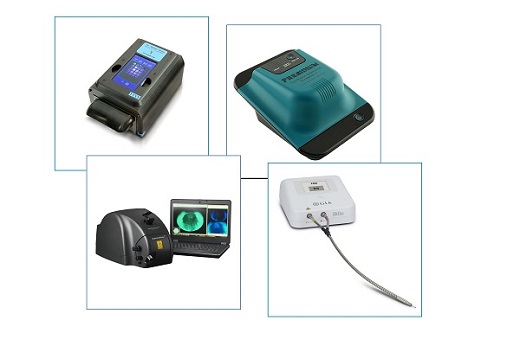|
|
DPA Puts Synthetics Detectors to the Test
Mar 5, 2019 10:45 AM
By Rapaport News
|
|
|

RAPAPORT... A synthetics detector costing less than $7,000 is one of only two machines that conclusively identified 100% of lab-grown diamonds in a recent industry-wide
study.
Yehuda’s Sherlock Holmes, priced at $6,495, correctly
spotted all synthetic diamonds in a “deliberately challenging” sample,
according to a report the Diamond Producers Association (DPA) and Signet
Jewelers released Tuesday.
De Beers’ DiamondView, which costs $35,000, also scored full
marks. DiamondView didn’t mislabel any synthetics as natural, while Sherlock Holmes was wrong for 2.5% of mined stones.
Two other De Beers products, SYNTHdetect ($17,000) and
DiamondSure ($18,200), accurately referred all lab-growns for further testing,
as did the Gemological Institute of America’s (GIA) iD100 ($4,995), HRD
Antwerp’s M-Screen+ ($63,000), and Presidium’s Synthetic Diamond Screener II ($599). Those machines are designed to refer synthetics
rather than detect them conclusively, according to the study, known as the Assure Program.
The DPA and Signet tested the ability of 18 scanners from 11
manufacturers to identify natural diamonds, synthetics and simulants from a
mixed batch, the two organizations said. They assessed the machines’
performances against a standard developed by UL, a third-party testing agency, as
well as a technical committee comprising scientists and academics from
gemological institutions, including the GIA and De Beers’ International
Institute of Diamond Grading & Research. Testing took place at UL’s
laboratories in Canton, Massachusetts.
The wide-ranging research looked at how well each contraption detected or referred man-made stones, including the rate at which they gave false positives. The DPA has published the full results in a directory on its website.
The directory also lists key characteristics of the machines, such as whether they work automatically or manually or require an expert operator, as well as the speed at which they process stones, which varies significantly.
For instance, DiamondView and Sherlock Holmes require expert operators, while a novice can use Synthetic Diamond Screener II. Not all the machines in the test work on mounted jewelry, and one of them, Taidiam Technology’s DiamondDect 5, only looks for High Pressure-High Temperature (HPHT)
goods.
“Through the Assure Program, we will support the diamond
trade, from independent jewelry retailers to large diamond manufacturers, to
make informed decisions on how to ensure that undisclosed laboratory-grown
diamonds do not enter their natural-diamond supply chain,” said DPA CEO
Jean-Marc Lieberherr.
The Assure program will update its directory as
manufacturers submit new instruments, it said.
Clarification, March 6, 2019: This article was updated to clarify the methods and results of the test.
Correction, March 11, 2019: The Assure Program’s initial
report on Presidium’s Synthetic Diamond Screener II incorrectly stated that it
had scored 100% for “synthetic-diamond accuracy,” which refers to its ability
to identify lab-grown stones conclusively. The report also incorrectly gave the
machine a “synthetic-diamond false-positive” score of 15.5%, implying that it
wrongly classified that percentage of all natural diamonds as synthetic. The
Assure Program has since updated its report to reflect that the machine only
refers stones for further testing, rather than categorically identifying them.
As such, the device no longer has a score for either of those categories, and
instead has a “synthetic-diamond referral rate” of 100%, which means it
correctly referred all synthetics for further testing. We have updated this
article with those factual changes. The update also means that only two
machines in the Assure test conclusively identified 100% of lab-grown diamonds,
and not three as this story previously said.
Image: A selection of detection machines that underwent testing. (Diamond Producers Association)
|
|
|
|
|
|
|
|
|
|
Tags:
Assure Program, Canton, De Beers, detection, Diamond Producers Association, DiamondView, Dpa, Gemological Institute of America, GIA, HRD Antwerp, iD100, International Institute of Diamond Grading & Research, Jean-Marc Lieberherr, Massachusetts, M-Screen+, Rapaport News, Sherlock Holmes, Signet, Signet Jewelers, SYNTHdetect, Synthetic Diamond Screener II, Synthetic diamonds, Synthetics, synthetics detection, technology, UL, Yehuda
|
|
|
|
|
|
|
|
|
|
|

|
|